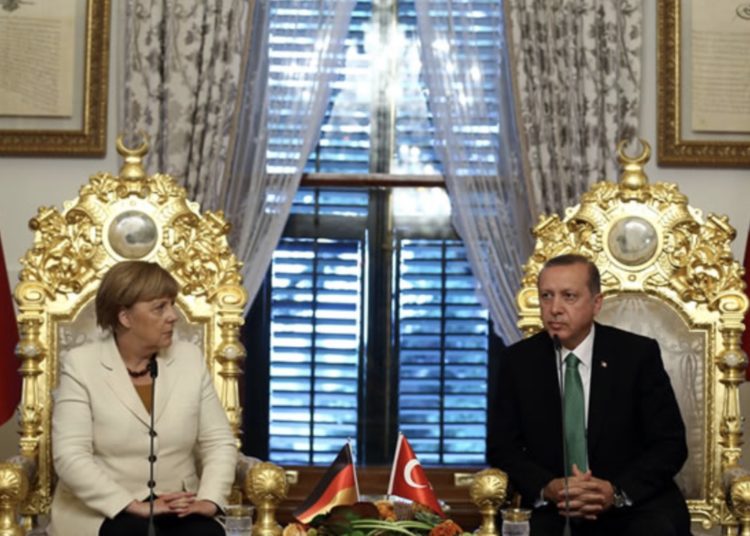Nordic Monitor
Secret negotiations between Turkey and the European Union over refugees have begun following the blackmail threatened by Turkish President Recep Tayyip Erdoğan, who has repeatedly said he would unleash a wave of Syrian and other refugees to flood Europe and destabilize the bloc’s governments.
According to information received by Nordic Monitor, Erdoğan is demanding additional billions of euros from the EU member states and support for his stated policy of establishing a safe zone in northern Syria. It appears Erdoğan’s blackmail triggered a new series of EU-Turkey diplomatic talks aimed at keeping refugees out of Europe. Negotiations are being conducted in secret in order to avoid a negative public reaction after the fallout from the controversial refugee deal of 2016, which has been described by advocacy groups and human rights organizations as a shameful stain on the collective conscience of Europe.
According to Turkey’s presidential communications office, Erdoğan spoke to German Chancellor Angela Merkel over the phone on Wednesday. Erdoğan and Merkel focused on migration, developments in Syria and bilateral relations, the office said in a statement. Leaks from both sides indicated that the Turkish president pressured Merkel, architect of the 2016 refugee deal, to extend the financial benefits of the previous agreement.
Two days after the phone call, on Friday, EU and Turkish delegations met in Brussels. The Turks, headed by Deputy Foreign Affairs Minister Faruk Kaymakcı, discussed issues related to migration with officials from the European Commission and the European External Action Service, the official statements revealed. Sources indicated that Kaymakçı led an advance team that might have been instructed to define the ground rules for further negotiations and explore the possibility of a summit.

Meanwhile, Deputy Interior Minister Muhterem İnce and German Minister of Interior Horst Seehofer also met in Berlin on Friday. İnce was accompanied by Abdullah Ayaz, director general of migration management and responsible for the implementation of policies and strategies related to migration in Turkey and coordination between the relevant agencies and organizations.
The latest developments reveal the EU is considering striking a fresh migrant deal with Erdoğan. A possible extension was also signaled by Dutch Prime Minister Mark Rutte and Greek Prime Minister Kyriakos Mitsotakis last week. The day after Erdoğan’s threat, Rutte said the deal should be renegotiated. However, they appear to have been surprised by Erdoğan’s additional requests that may cost more than expected.
The new agreement will worsen the situation for the Syrians whose destiny rests in the hands of an Islamist dictator. Unfortunately, Turkey has reversed course, forcing thousands to leave its major cities in recent weeks and transporting many of them to its border with Syria in buses and police vans.
The Turkish president plans to resettle 1 million refugees in northern Syria. Last week he said he would build luxurious houses in the safe zone that Turkish and US officials are creating east of the Euphrates River. If the safe zone is not established to his satisfaction by the end of the month, Turkey will move unilaterally against the Kurdish People’s Protection Units (YPG), he also said. This threat came not long after his threat to open the border and flood the EU with migrants, indicating that the two are related.
Moreover, Erdoğan wants the funds transferred directly to his government, but the EU is unwilling to directly fund a government that is accused of corrupt and non-transparent tender practices. The agreement stipulates that funding be sent to finance projects through the mediation of official EU institutions, European development and investment banks and UN institutions.

Migration has become a leading topic of discussion in the bloc’s national parliaments since the beginning of the Syrian crisis, and the agreement allowed EU countries to return Syrian asylum-seekers to squalid camps in Turkey. The EU thus turned a blind eye to the anti-democratic rule of the Erdoğan regime in exchange for stronger controls on refugees leaving Turkish territory for Europe.
Since major corruption investigations that incriminated Erdoğan in December 2013, Erdoğan has presided over an Islamist regime in Turkey that has not received harsh criticism from the EU, in part due to the migration issue and in part because of trade and business interests. In the meantime Turkey’s human rights record has gone from bad to worse. The peace process with the Kurds was shelved by Erdoğan in 2015 when he realized his party was not benefiting politically and was losing votes to a pro-Kurdish party. Since a failed 2016 coup attempt, which many believe was orchestrated by Erdoğan as a false flag, over half a million people have been detained under the country’s abusive anti-terror laws, many of whom were subjected to torture and ill treatment in detention facilities and prisons. In addition to some 200 journalists, dozens of current and former MPs and academics and thousands of judges were imprisoned.












